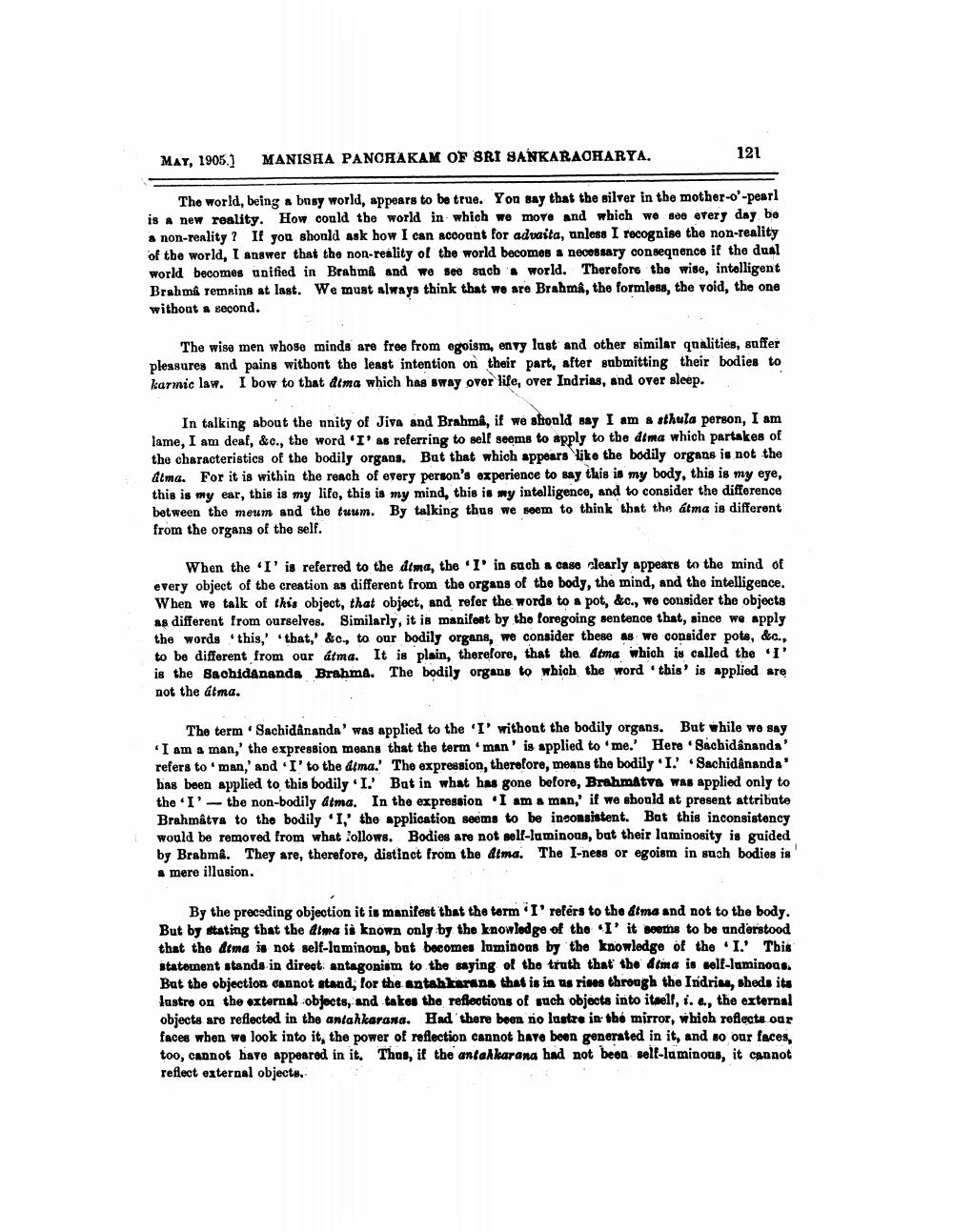________________
MAY, 1905.)
MANISHA PANCHAKAM OF SRI SANKARACHARYA,
121
The world, being a busy world, appears to be true. You say that the silver in the mother-o'-pearl is a new reality. How could the world in which we move and which we see every day be a non-reality? If you shonld ask how I can account for advaita, unless I recognise the non-reality of the world, I answer that the non-reality of the world becomes a necessary consequence if the dual world becomes unified in Brahma and we see sacb* world. Therefore the wise, intelligent Brahmi remains at last. We must always think that we are Brahma, the formless, the void, the one without a second.
The wise men whose minds are free from egoism, envy last and other similar qualities, suffer pleasures and pains withont the least intention on their part, after submitting their bodies to karmic law. I bow to that dima which has sway over life, over Indrias, and over sleep.
In talking about the nnity of Jiva and Brahma, if we should say I am a sthula person, I am lame, I am deaf, &c., the word 'I' as referring to self seems to apply to the dema which partakes of the characteristics of the bodily organs. But that which appears like the bodily organs is not the atma. For it is within the reach of every person's experience to say this is my body, this is my eye, this is my ear, this is my lifo, this is my mind, this is my intelligence, and to consider the difference between the meum and the tuum. By talking thus we seem to think that the atma is differont from the organs of the self.
When the 'I' is referred to the doma, the l' in such a case clearly appears to the mind of every object of the creation as different from the organs of the body, the mind, and the intelligence. When we talk of this object, that object, and refer the words to a pot, &c., we consider the objects as different from ourselves. Similarly, it is manifest by the foregoing sentence that, since we apply the words this,' that,' &c., to our bodily organs, we consider these as we consider pots, &c., to be different from our átma. It is plain, therefore, that the atma which is called the I is the Sachidananda Brahma. The bodily organs to which the word this' is applied are not the atma.
The term Sachidananda' was applied to the T' without the bodily organs. But while wo say I am a man,' the expression means that the term 'man' is applied to me.' Here Sachidananda' refers to man,' and I' to the dema. The expression, therefore, means the bodily .1!' Sachidananda' bas been applied to this bodily I. But in what has gone before, Brahmatva was applied only to the 'I' - the non-bodily atma. In the expression I am a man,' if we should at present attribute Brahmâtva to the bodily 'I,' the application seems to be inconsistent. Bat this inconsistency would be removed from what follows. Bodies are not self-laminous, but their luminosity is guided by Brahma. They are, therefore, distinct from the atma. The I-ness or egoism in such bodies is a mere illusion.
By the preceding objection it is manifest that the term I' refers to the dtma and not to the body. But by stating that the atma is known only by the knowledge of the I' it seems to be understood that the dema is not self-luminous, but becomes luminous by the knowledge of the I.' This statement stands in direct antagonism to the saying of the truth that the doma is self-luminoas. But the objection cannot stand, for the entahkarana that is in us rises through the Indring, sheds its lastre on the external objects, and takes the reflections of such objects into itself, i. e, the external objects are reflected in the antahkarana. Had there been no lugtze in the mirror, which reflects our faces when we look into it, the power of reflection cannot have been generated in it, and so our faces, too, cannot have appeared in it. Thos, if the antahkarana had not been sell-laminous, it cannot reflect external objects.




